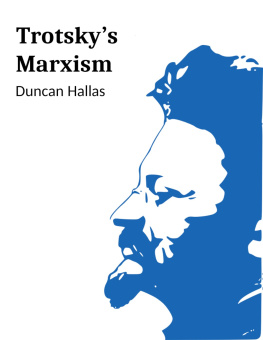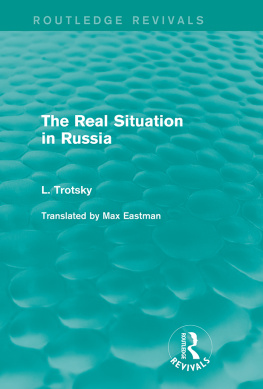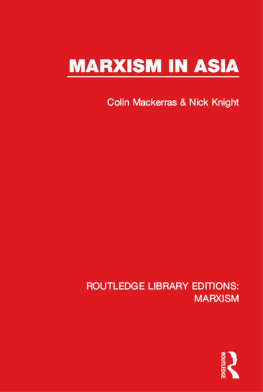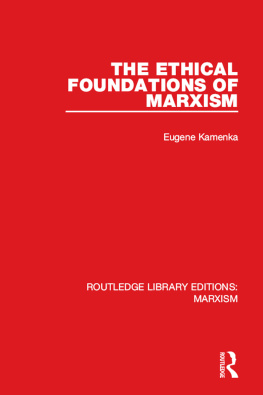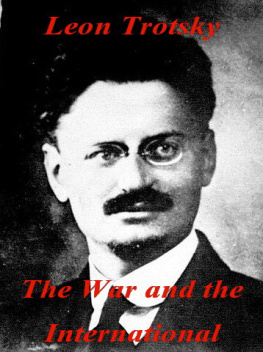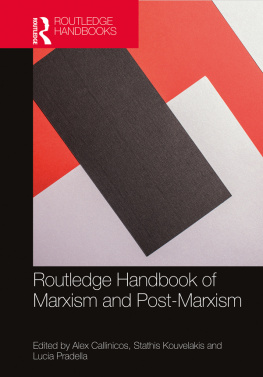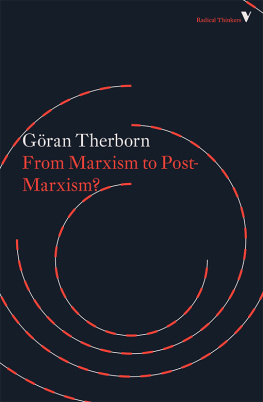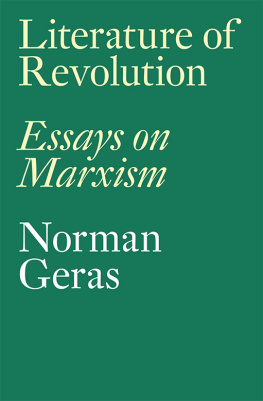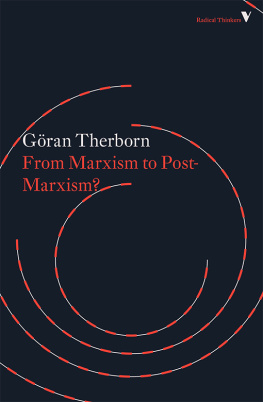Duncan Hallas - Trotskys Marxism
Here you can read online Duncan Hallas - Trotskys Marxism full text of the book (entire story) in english for free. Download pdf and epub, get meaning, cover and reviews about this ebook. year: 2021, publisher: Marxists Internet Archive, genre: Politics. Description of the work, (preface) as well as reviews are available. Best literature library LitArk.com created for fans of good reading and offers a wide selection of genres:
Romance novel
Science fiction
Adventure
Detective
Science
History
Home and family
Prose
Art
Politics
Computer
Non-fiction
Religion
Business
Children
Humor
Choose a favorite category and find really read worthwhile books. Enjoy immersion in the world of imagination, feel the emotions of the characters or learn something new for yourself, make an fascinating discovery.
- Book:Trotskys Marxism
- Author:
- Publisher:Marxists Internet Archive
- Genre:
- Year:2021
- Rating:5 / 5
- Favourites:Add to favourites
- Your mark:
- 100
- 1
- 2
- 3
- 4
- 5
Trotskys Marxism: summary, description and annotation
We offer to read an annotation, description, summary or preface (depends on what the author of the book "Trotskys Marxism" wrote himself). If you haven't found the necessary information about the book — write in the comments, we will try to find it.
Trotskys Marxism — read online for free the complete book (whole text) full work
Below is the text of the book, divided by pages. System saving the place of the last page read, allows you to conveniently read the book "Trotskys Marxism" online for free, without having to search again every time where you left off. Put a bookmark, and you can go to the page where you finished reading at any time.
Font size:
Interval:
Bookmark:
Trotskys
Marxism
Duncan Hallas

Reprinted by Bookmarks, London, 1984 & 1987.
1984 Bookmarks & Duncan Hallas.
Transcribed and marked up by Einde OCallaghan for the Marxists Internet Archive .
eBook conversion and minor typographical fixes by Leah Drake, January 2021.
Available online at https://www.marxists.org/archive/hallas/works/1979/trotsky/
This little work owes its existence to the encouragement, advice and practical help of Tony Cliff.
Insofar as its treatment of Trotskys thought is in any way unusual, it is very heavily dependent on Cliffs own appreciation and critique from 1947 onwards. Of course, Cliff is not responsible for every emphasis I have made.
Three other specific acknowledgements must be made. To Nigel Harris, whose writings and conversation have considerably modified my own first assessment of Trotsky; to John Molyneux, whose Marxism and the Party has influenced me more than may appear from a superficial view of our respective writings on the subject; and to Chanie Rosenberg who converted my handscript into type in the odd intervals of a very active political life and without whose efforts it would never have seen the light of day.
Duncan Hallas
July 1979
Leon Trotsky was born in 1879 and grew to manhood and to consciousness in a world that has passed away, the world of the social-democratic marxism of the Second International.
In any generation there are many possible mental worlds, rooted in the widely differing circumstances, social organisation and ideologies that co-exist at any one time. That of social democracy was the most advanced, the closest approximation to a scientific, materialist world outlook that then existed.
For Lev Davidovitch Bronstein (the name of Trotsky was borrowed from a jailer), son of a Ukrainian Jewish peasant family, to attain that outlook was remarkable enough. The older Bronstein was a well-to-do peasant, a kulak otherwise Trotsky would have received very little formal education and he was a Jew in a country where anti-Semitism was officially encouraged and actual pogroms not rare. At any rate, the young Trotsky became, after an initial period of romantic revolutionism, a marxist. And very soon, under the condition of Tsarist autocracy, a professional revolutionary and a political prisoner. First arrested at the age of 19, he was sentenced to four years deportation to Siberia after spending 18 months in jail. He escaped in 1902 and, from then until his death, revolution was his profession.
This small book is concerned with ideas rather than events. Least of all is it an attempt at a biography. Isaac Deutschers three volumes, whatever view is taken of the authors political conclusions, will remain the authoritative biographical study for a very long time.
Yet any attempt to present a summary of Trotskys ideas runs into an immediate difficulty. Much more than most of the great marxist thinkers (Lenin is an outstanding exception), Trotsky was concerned throughout his life with the immediate problems facing revolutionaries in the workers movement. Nearly everything he said or wrote relates to some immediate issue, to some current struggle. The contrast with what has come to be called Western marxism could hardly be more marked. A sympathetic chronicler of this latter trend has written: The first and most fundamental of its characteristics has been the structural divorce of this marxism from political practice. That is the last thing that could ever be said of Trotskys marxism.
Therefore it is necessary to present, in however sketchy and inadequate a fashion, some elements of the background against which Trotsky formed his ideas.
Russia was backward, Europe advanced. That was the basic idea of all Russian marxists (and not of marxists alone, of course). Europe was advanced because its industrialisation was well developed and because social democracy, in the form of sizeable workers parties professing allegiance to the marxist programme, was growing fast. For Russians (and to some extent generally) the parties of the German speaking countries were the most important. The social-democratic parties of the German and Austrian Empires were expanding workers parties which had adopted fully marxist programmes (the German Erfurt programme of 1891, the Austrian Heinfeld programme of 1888). Their influence on Russian marxists was immense. The fact that Poland, whose working class was already stirring, was partitioned between the empires of the Tsar and the two Kaisers strengthened the connection. Rosa Luxemburg, it will be recalled, was born in Russian-occupied Poland, but became prominent in the German movement. There was nothing out of the way in this. Social democrats then regarded national boundaries as secondary.
In terms of ideas, this growing movement (illegal in Germany between 1878 and 1890, but polling one and a half million votes on a restricted suffrage in the latter year) was sustained by the synthesis of early marxism and late nineteenth century developments that had been achieved by Friedrich Engels. His Anti-Duhring (1878), an attempt at an overall, scientifically grounded world view, was the basis for the popularisations (or vulgarisations) of Karl Kautsky, the pope of marxism, and of the more profound expositions of the Russian G.V. Plekhanov.
In this exciting intellectual/practical world for Engels and his disciples and imitators had established a link between theory and practice in the workers party the young Trotsky grew intellectually and soon became something more than a disciple of his elders. His respect for Engels was immense.
Yet he was, within a few years of his first assimilation of the marxist world outlook, to challenge the then marxist orthodoxy on the question of the backward countries. But first he was to meet the emigre leaders of Russian marxism and to play a prominent role in the 1903 congress of the Russian Social Democratic Labour Party the real founding conference.
Trotsky escaped from Verkholensk in Siberia, hidden under a load of hay, in the summer of 1902. By October he had arrived at the directing centre of Russian social democracy, then situated near Kings Cross station in London. Lenin, Krupskaya, Martov and Vera Zasulich all lived in the area and from here Iskra , the organ of the advocates of a centralised, disciplined party, was produced and dispatched to the underground in Russia. Trotsky was soon involved in the disputes within the Iskra team Lenin wished to add him to the editorial board, Plekhanov resolutely opposed the idea and so came to know at close quarters the future leaders of Menshevism, Plekhanov and Martov, as well as Lenin. For the split in the Iskra group was already gestating.
It came into the open at the congress in the summer of 1903. The Iskra -ists stood together in resisting the demands of the Jewish socialist organisation, the Bund, for autonomy so far as work amongst Jewish people was concerned, and in resisting the reformist tendency of the Economists. Then came the split in the Iskra group itself into the Bolshevik majority and the Menshevik minority.
It was not clear cut at first the issues themselves were not yet clear. Plekhanov sided with Lenin initially, Trotsky supported the Menshevik leader Martov.
Two years later Trotsky was back in Russia. The revolution of 1905 was under way. In the course of it Trotsky rose to his full height. Still only 26 years old, he became the most prominent single revolutionary leader and an internationally known figure. He emerged from the background of small group and emigr politics transformed into a magnificent orator and mass leader. As President of the Petrograd Soviet he was able to exert a considerable degree of tactical leadership and demonstrated that sure touch and iron nerve which was to characterise him in the greater upheavals of 1917.
Next pageFont size:
Interval:
Bookmark:
Similar books «Trotskys Marxism»
Look at similar books to Trotskys Marxism. We have selected literature similar in name and meaning in the hope of providing readers with more options to find new, interesting, not yet read works.
Discussion, reviews of the book Trotskys Marxism and just readers' own opinions. Leave your comments, write what you think about the work, its meaning or the main characters. Specify what exactly you liked and what you didn't like, and why you think so.

